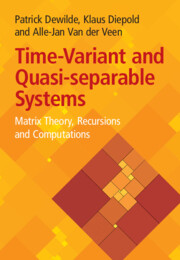Book contents
- Frontmatter
- Contents
- Preface
- Acknowledgements
- Part I Lectures on Basics with Examples
- 1 A First Example: Optimal Quadratic Control
- 2 Dynamical Systems
- 3 LTV (Quasi-separable) Systems
- 4 System Identification
- 5 State Equivalence, State Reduction
- 6 Elementary Operations
- 7 Inner Operators and External Factorizations
- 8 Inner−Outer Factorization
- 9 The Kalman Filter as an Application
- 10 Polynomial Representations
- 11 Quasi-separable Moore−Penrose Inversion
- Part II Further Contributions to Matrix Theory
- Appendix: Data Model and Implementations
- References
- Index
8 - Inner−Outer Factorization
from Part I - Lectures on Basics with Examples
Published online by Cambridge University Press: 24 October 2024
- Frontmatter
- Contents
- Preface
- Acknowledgements
- Part I Lectures on Basics with Examples
- 1 A First Example: Optimal Quadratic Control
- 2 Dynamical Systems
- 3 LTV (Quasi-separable) Systems
- 4 System Identification
- 5 State Equivalence, State Reduction
- 6 Elementary Operations
- 7 Inner Operators and External Factorizations
- 8 Inner−Outer Factorization
- 9 The Kalman Filter as an Application
- 10 Polynomial Representations
- 11 Quasi-separable Moore−Penrose Inversion
- Part II Further Contributions to Matrix Theory
- Appendix: Data Model and Implementations
- References
- Index
Summary
This chapter considers likely the most important operation in system theory: inner–outer and its dual, outer–inner factorization. These factorizations play a different role than the previously treated external or coprime factorizations, in that they characterize properties of the inverse or pseudo-inverse of the system under consideration, rather than the system itself. Important is that such factorizations are computed on the state-space representation of the original, that is, the original data. Inner–outer (or outer–inner) factorization is nothing but recursive “QR factorization,” as was already observed in our motivational Chapter 2, and outer–inner is recursive “LQ factorization,” in the somewhat unorthodox terminology used in this book for consistency reasons: QR for “orthogonal Q with a right factor R? and LQ for a “left factor” L with orthogonal Q?. These types of factorizations play the central role in a variety of applications (e.g., optimal tracking, state estimation, system pseudo-inversion, and spectral factorization) to be treated in the following chapters. We conclude the chapter showing how the time-variant, linear results generalize to the nonlinear case.
Keywords
- Type
- Chapter
- Information
- Time-Variant and Quasi-separable SystemsMatrix Theory, Recursions and Computations, pp. 115 - 135Publisher: Cambridge University PressPrint publication year: 2024

